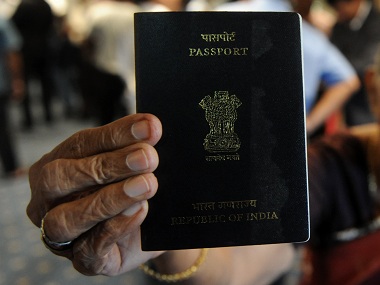After the central government came under a lot of criticism, the Ministry of External Affairs (MEA) on Tuesday
reversed its earlier decisions and announced that it would not issue a separate orange-coloured passport to people requiring emigration check and would continue printing personal details on the last page of the booklet. The original decision On 12 January, the External Affairs Ministry
had decided not to print the last page of the passport with the address of the holder. The last page of the passport includes the father or legal guardian’s name, the names of the holder’s mother, spouse and their address. [caption id=“attachment_4300133” align=“alignleft” width=“380”] Representational image. AFP[/caption] It further decided to issue a separate orange-coloured passport to people with Emigration Check Required (ECR) status. Emigration check is required for passport holders, not having education beyond Class X, and having less than taxable income, who seek migration for employment. “As the last page of the passport would not be printed now, the passport holders with ECR status would be issued a passport with orange passport jacket and those with non-ECR status would continue to get a blue passport,” an MEA statement had said.
The recommendations of a three-member panel, comprising officials from MEA and the ministry of women and child development, were accepted and it was decided that the last page of the passport and other travel documents issued under the Passports Act, 1967 and Passport Rules, 1980 “would no longer be printed”.
The panel examined various issues “pertaining to passport applications including examination of where mother/child had insisted that the name of the father should not be mentioned in the passport and also relating to passport issues to children with single parent and to adopted children.”
Moreover, as The Hindu points out, the Modi government has been trying to streamline the passport application and delivery process. One of the reasons behind MEA’s original decision to not print the last page of the passport was that the MEA was trying to make passports more gender-just.
The decision to print a separate orange-coloured passport was also aimed at protecting Indians abroad, especially in West Asia where many of them face exploitation. The backlash The MEA’s original decision immediately resulted in a lot of backlash. On 14 January, Congress president Rahul Gandhi attacked the government over this decision.
Treating India's migrant workers like second class citizens is completely unacceptable. This action demonstrates BJP’s discriminatory mindset.https://t.co/6iiOy2rPKC
— Rahul Gandhi (@RahulGandhi) January 14, 2018
Two days later, Kerala chief minister Pinarayi Vijayan also asked the Centre to “rectify” its decision to allot two different colours for passports, saying it amounted to violation of the Fundamental Right to Equality guaranteed to a citizen under the Constitution. “The decision will discriminate between ordinary workers and educated ones,” Vijayan had said. He had also said that this would lead to a situation wherein those who have not passed the tenth standard would be considered as second class citizens. The Kerala chief minister had said that a majority of persons going abroad from the country were ordinary workers, including those who have not completed tenth standard. “You can see such persons even in business community…if separate colour passport is issued to them and they go abroad, it would create an impression that they are second class citizens,” he had said. And on Monday, a day before the government rescinded its decision, the Kerala High Court issued a notice to the central government on PIL challenging its decision. In his plea, lawyer Shamsuddeen Karunagappally had argued that such a move would lead to segregation of people with low education and low economic status. The petitioner had contended that the move would make their underprivileged status known publicly through separate colour code. It is a grave invasion of their fundamental right to privacy and dignity, he had said. There is no rational objective to be achieved through this segregation. It is demeaning and shockingly violative of the principle of equality, the petitioner had said. The move will create practical hardships to migrant workers, as the chances of harassment and exploitation will increase when their vulnerable status is made apparent on the passport through separate colour code, he had alleged. The petitioner was also aggrieved by the government’s decision to omit last page of the passport containing details including the holder’s address. The reversal The decision to reverse the original decisions was taken at a meeting, chaired by External Affairs Minister Sushma Swaraj and attended by one of her two deputies VK Singh among others. “The MEA has received several individual and collective representations requesting to reconsider these two decisions…the decision of the MEA on both these issues was reviewed in the light of these representations,” the MEA said in a statement. After comprehensive discussions with the various stakeholders, “the MEA has decided to continue with the current practice of printing of the last page of the passport and not to issue a separate passport with orange colour jacket to ECR passport holders”, the release had said. With inputs from PTI


)

)
)
)
)
)
)
)
)



